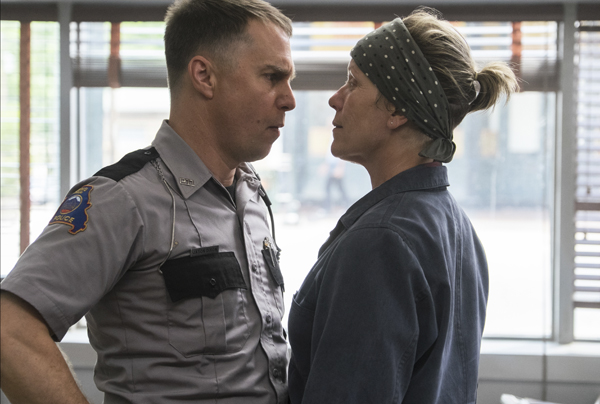
Sam Rockwell and Frances McDormand in Three Billboards Outside Ebbing, Missouri (Merrick Morton/Twentieth Century Fox)
Revenge is served in many ways, all violently, in Three Billboards Outside Ebbing, Missouri, a comedy of crime and culpability, which won the Toronto International Film Festival’s People’s Choice Award, giving its prospects during the awards season a boost. (Last year’s popular choice was the award-lauded La La Land.) It also scored Best Screenplay at the Venice Film Festival. As noted in an earlier post, this was an atypical year in which the two overlapping festivals came to agreement when it came to awards. The Toronto win wasn’t surprising, though. At its North American premiere, there was a lovefest between the audience, the film, and the director and lead actors, who were all in attendance.
It’s equally a black comedy of revenge as it is a comedy of anger, which is the predominant emotion that propels everywoman Mildred Hayes to call out the local police for its sluggish investigation of the rape and murder of her teenage daughter months earlier. In response to the fruitless investigation, she rents three derelict billboards on a little-traveled back road to call into question the integrity of police chief Willoughby (Woody Harrelson). (She pays $5,000 for one month’s rental; add highway robbery to the film’s accruing list of crimes.) The billboards are unveiled on Easter Sunday and make the local news by Monday. Though there is a delayed reaction, the blue line of silence bites back.
Though played for uncomfortable laughs, the film’s nearly structured like a Western: Mildred vs. the calcified, intransient, seemingly reactionary mind-set of her defensive hamlet. Yet one would think that the town would rally to her side. After all, a teenager was burned to death and raped. But instead of outrage and fear, there’s complacency. That might be because the town never feels real or comes into its own as a character, even though the setting is embedded in the title.
From the first shot of the verdant mountainous hillside, the viewer is nowhere near the Show-Me State. Instead, it was shot in the tax rebate-haven of North Carolina, in and around Asheville and Sylvia. The town appears to have one generic Main Street and a population of about 20; the budget skipped on extras. When it’s mentioned that the community is against Mildred’s course of action, viewers will ask, who? The handful of passersby in the background?
Director Martin McDonagh wrote the part of Mildred for Frances McDormand (“I would have been f***** if she said no,” he said after the screening), and the slow-witted, emotionally-driven, and ethics-deficient copper Jason Dixon with Sam Rockwell in mind. The parts fit the actors like gloves. However, these are not roles that stretch their on-screen personas. Viewers have seen these actors play close-knit variations of these parts many times over. (Actually, McDormand may have been born too late; she would have been an ideal screwball comedy heroine. She venomously launches McDonagh’s dialogue as volleys of destruction that hit their targets time and again.)
On the other hand, Rockwell plays Dixon as an abusive doofus. It strains belief when Dixon’s superior officer, Willoughby, finds the hot-headed Dixon “a good man at heart.” Dixon reacts so violently that his behavior poses a considerable challenge for McDonagh to soften the renegade officer, or to make any redemption for him possible and not too incredible. The cop commits so many violations he calls Willoughby’s judgment into question.
I have seen the film with two completely different audiences. The one in Toronto was receptive to every zinger and felt like a Friday Night crowd letting off steam–even though it was a Monday evening. Less than two months later, at a well-attended press screening in New York, I was able to hear all of the dialogue, as though the actors were pausing for the audience’s response. This was not as apparent during the raucous Toronto reception, where the more farcical scenes played better. The verbiage still stings regardless of the size of the audience, yet don’t be surprised if there is dead air when viewing it one-on-one.
Nevertheless, the film offers one of the most indelible performances of the year: Sandy Martin as Dixon’s frog-throated, chain-smoking, malevolent Mama Dixon, a beer-swillin’, coach potato Lady Macbeth with a 1980s Go-Go’s flattop. Mama Dixon directs her son to attack Mildred indirectly by messing with her friends (that’s the cleaned-up version of her acidic advice). So when Mildred shows up at her job at the Southern Charms Gift Shop, there’s a post-it on the front door: her coworker, Denise (Amanda Warren), who is black, has been arrested and hauled off to jail.
This plot twist will point out what is already glaringly obvious, which is Mildred, a white middle-aged single-mother, stands in as a victim of police apathy and a symbol of rage. There are references throughout that Dixon has a reputation for beating up and falsely arresting African Americans, yet the black townsfolk remain on the periphery. After her arrest, Denise disappears from the movie and becomes nearly forgotten, only to pop up again toward the end. As a result, the film ends up taking on more issues than it can hold. It also makes no pretense toward sensitivity, reveling in its coarseness, which is where most of its humor comes from (including the use by whites of the N-word).
Besides being willing to offend, McDonagh takes chances as a storyteller. No one could accuse him of playing it safe or foreshadowing where the story line will ricochet toward. Crucially, the movie accomplishes its main goal: it is funny, with the sort of pitch-perfect comebacks that most of us wish we were capable of spewing. And many of the zingers are directed toward Mildred, less a crusader and more a tragic figure as she becomes as impulsive as Dixon. She becomes an imperfect messenger for an imperfect film.
















Leave A Comment